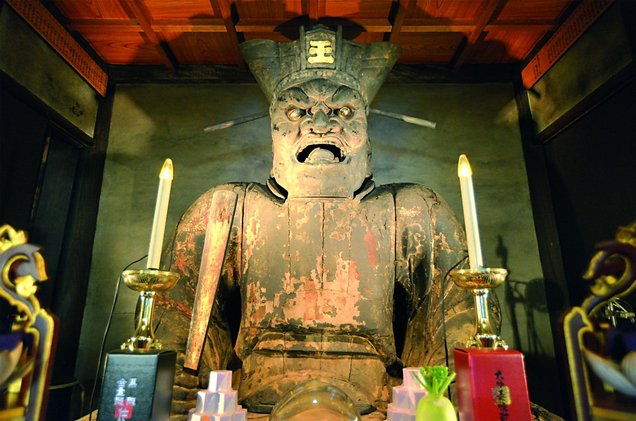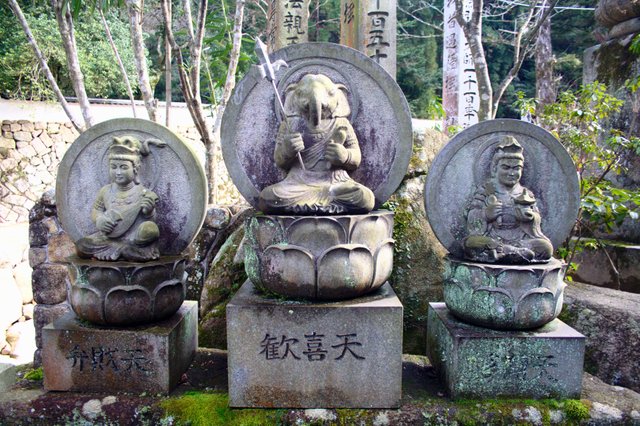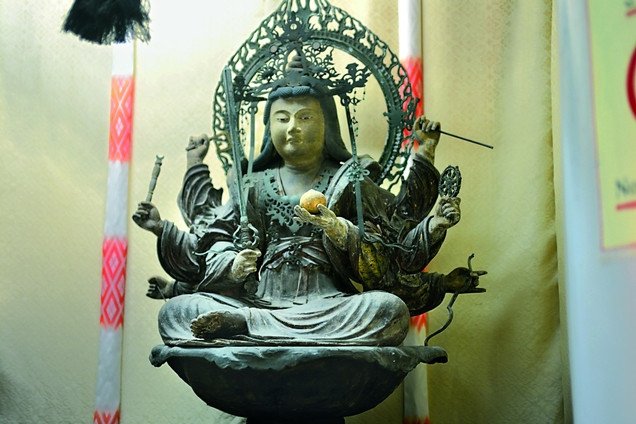Ancient Indian Influence on Japanese Culture and Religion: Hindu Deities Worshipped in Japan
Did you know that around 20 Hindu deities are worshipped in Japan to this day? In fact some of the deities no longer worshipped in India, like Varuna, Indra, Brahma, Yama, Kaamdev etc., are still worshipped. And other gods like Saraswati, Ganesh and Shiva, are among the most revered among the Japanese population, just like they are in India today!
Even the prayers and mantra's recited are in Sanskrit, with the script being instead the ancient "Siddha" script, which has long been replaced in India with the "Devanagari" script for more than a millennium!
Yasukuni Enoki, Former Ambassador of Japan in India

Japanese names for Hindu gods
In Japan today there are hundreds of shrines to Goddess Saraswati alone, along with innumerable representations of Lakshmi, Indra, Brahma, Ganesha, Garuda and other gods from the Hindu pantheon. But the names have changed and they have their own name.
For example, the goddess Saraswati is one of the most revered and is referred to as "Benzaiten", and like in India is the goddess of knowledge, art, beauty and music. And as the former Japanese Ambassador in India has noted:
“Since these Hindu deities were introduced into Japan through China, with Chinese names, Japanese people are unaware of their origins”

Prayers and Rituals
Most of the prayers to these deities are in Sanskrit, and there are a few Temples which teach Sanskrit to Japanese monks, but the script used is the old script of "Siddha" which was prevalent in India around the 5th century. Since then, it has been replaced by the modern "Devanagari" script and the Siddha script has become obsolete and no longer read or used in India.
But in Japan the Siddha or Siddham script is alive and kicking, to the point that every Temple in Japan has a unique alphabet from this script engraved on that Temple as a distinguishing symbol, which in Sanskrit is known as the "Bija Akshara", or the "seed alphabet", a sacred syllable as powerful as a mantra and associated with a deity.
As for rituals, many in India would be surprised to know that the Hindu ritual of a "homa" or "havan" (Goma in Japanese) is performed with the same regularity in Japan as here. A havan is a ritual conducted during the worship of the Fire/Agni, and it is performed with the same mantra's and with the utterance of the word "Swa-ha". Which should make an Indian feel right at home in a Japanese Temple!

Hinduism, Buddhism and the Samurai
It goes without saying that religion plays a part in how cultures evolve and especially so in ancient times. As Hinduism, and later Buddhism, was introduced to Japan over a period of centuries, it did have an influence on the popular culture at a certain period in time, and has evolved to what it is today. It cannot be denied that religion was a large force in the evolution of cultures through the centuries, and if certain ideologies were accepted, then it must have influenced the way of life of its adherents too.
But it seems also seems plausible that the Samurai code was influenced by Zen Buddhism, because the basic philosophy behind this thought was that, in the cosmic timeline, our life is but a fleeting fraction of a second, so basically nothing matters and is not worth anything. And a life lived with that knowledge would have suited the violent creed of these famous warriors, who never knew if they were to return alive from a skirmish, or if it was the end of their time here on earth.
But today the world is slowly waking up to the fact that the Hindu Civilization had a large impact in ancient times, traces of which can be seen all over Asia already, and some other places on the planet, which is being researched at last!
- Excellent documentary on you-tube (28 mins). Highly recommended.
- A good article on breitbart
- Wikipedia page
- A good article by Times of India
You may also click the down-arrow next to my name (before my reputation score below) to follow me. Or you may just re-steem to share the love! 😊
@norbu a nice article, it is also prominent in Chinese cultures as well as all Asia.
Indian culture was prominent in Shaolin monk disciplines, which in turn influence Okinawa and Japanese.
Yes a large part of Asia was influenced by the spiritual practices of India, and has left a stamp on all nations. It is only now these things are coming out. Thank you.
Nice content . Started following u , please follow back :D
Before invasion in India by the Mugals , Indian culture was widely followed all over the world .
Followed you back, thank you.
Great post! I'm happy to came across as I'm very surprise to learn this. Changes my perception about Japan. Wow.
Not many are aware of this as yet but glad youliked it. Thanks.
excellent writing .......... salute you boss :)
Thank you so much, your comments inspire me to write better about our common heritage.
this is amazing! i actually dint know about this until now ! thanks for sharing :D following you for more of these !
There is a lot to learn and discover about our common heritage which has been denigrated till now. Start knowing your own before you quest for the world, and you shall become a better person!
Thanks.
Awesome post!
I am no fan of religion but I love culture and history. A valuable post in that regard~*~
Neither am I a fan of religion but you could not escape it in antiquity! Thank you.
I used to read a lot bout deities of various cultures.
This was new to me.
Thanks
Yes a lot of people are finding this out now! Thank you for reading.
So ture,
Most Japanese are not recognize these as Hindu gods. They are enshrined in Buddism temples as Buddha. Modern Japanese do not believe Buddhism so much. It is like a custom.
The samurai of the Azuchi-Momoyama period, They believed in Christianity, Buddhism, and Animism by circumstances. It was when the most gorgeous samurai culture was.
In the Meiji period, however, one third of Buddhist temples were destroyed by the government. Modern Japan shaped by the fact that Japanese lost their own roots.
Impressed and appreciate for your writing...Really don't heard and unknown about such facts
Here in India, we never had any God/Gods, there were deities which is completely a different concept. Though many misinterpret Indians worshiping "Gods". It was a wonderful article. Thank you for writing this. Makes me feel closer to Japan.
Domo Arigato Gozaimashita